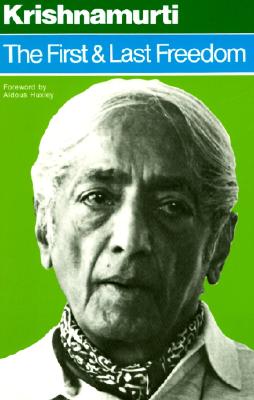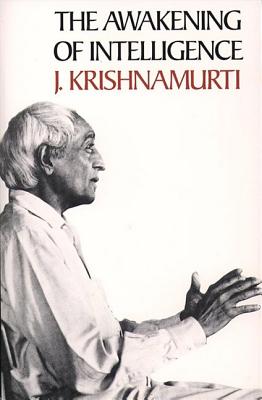


Did you know that there is a connection between neuroscience and free will? While humans have the power to make conscious choices, they are heavily influenced by social media, YouTube, the news they watch and read, their surrounding community, the people they interact with on a daily basis, and even the places they shop.
Philosopher, spiritual figure, and author Jiddu Krishnamurti reminds us, We look to someone to tell us what is right or wrong behavior, what is right or wrong thought, and in following this pattern our conduct and our thinking became mechanical, our responses automatic.
The good news is you can choose all of the things that influence your freedom.
Krishnamurti's Freedom from the Known will show you how to free yourself from the tyranny of the expected, so you can open the door to transform society and your relationships. You'll discover the primary cause of disorders is the reality promised by someone else instead of being our own authority for our way of life.
If you want to challenge the way you look at the world, enhance your spiritual awareness, and open your mind and hearts to others Freedom from the Known is for you. After reading, you'll gain a more meaningful perspective of life that will:
- Enhance your existing and future relationships
- Help you identify and overcome your fears
- Better understand the totality of life
- Enhance your communication skills
- Help you increase your confidence and ability to self-love
Krishnamurti reminds us, To understand yourself is the beginning of wisdom.

On Fear is a collection of Krishnamurti's most profound observations and thoughts on how fear and dependence affect our lives and prevent us from seeing our true selves. Among the many questions Krishnamurti addresses in these remarkable teachings are: How can a mind that is afraid love? And what can a mind that depends on attachment know of joy? He points out that the voice of fear makes the mind dull and insensitive, and argues that the roots of hidden fears, which limit us and from which we constantly seek escape, cannot be discovered through analysis of the past. Questioning whether the exercise of will can eliminate the debilitating effects of fear, he suggests, instead, that only a fundamental realization of the root of all fear can free our minds.

Do you ever feel like you are constantly searching for the right way to live? Are you searching for answers to cope with grief or hardships? Maybe you are seeking a resolution to a recurring problem?
The Book of Life written by--one of the greatest thinkers of our time-- Jiddu Krishnamurti guides you through 365 meditations so you can use your experiences to discover truth and the reality that already exists.
Krishnamurti believed that every aspect of life is interconnected. He explored nature of truth and freedom, and taught people that truth can be discovered by anyone and doesn't require an authority figure. The daily meditations are organized by months focusing on topics such as:
- Self-knowledge, listening, good and evil, and dependence
- Sex, fear, feelings, and energy
- Happiness, grief, perception, rebirth, and religion
- God, love, and aloneness
Each daily entry is brief and can be read in 5 to 10 minutes. Within entries, Krishnamurti poses questions for reflection and shares wisdom that you'll reference later. Some of those poignant messages are:
- Learning is always in the active present; it has no past.
- We follow another's authority, another's experience and then doubt it; this search for authority and its sequel, disillusionment, it a painful process for most of us.
- You discover yourself, not in isolation, not in withdrawal, but in relationship.
- The transformation of the world is brought about by the transformation of oneself, because the self is the product and a part of the total process of human existence.
The Book of Life is perfect for anyone interested in shifting their mindset, decreasing their stress levels, embracing a happier framework, and open to daily meditations.

Krishnamurti is a leading spiritual teacher of our century. In The First and Last Freedom he cuts away symbols and false associations in the search for pure truth and perfect freedom. Through discussions on suffering, fear, gossip, sex and other topics, Krishnamurti's quest becomes the readers, an undertaking of tremendous significance.



The provocative and penetrating philosophical classic of science and spirituality--a discourse between the revered spiritual leader Krishnamurti and renowned physicist Dr. David Bohm, exploring the origin of human conflict and what we can do about the barriers that stand in the way of insight and consciousness, now revised and updated with a new introduction and added dialogues.
The Ending of Time is a series of important and enlightening dialogues in which Jiddu Krishnamurti and Dr. David Bohm--men from vastly different backgrounds in philosophy and physics, respectively--debate profound existential questions that illuminate the fundamental nature of existence, probing topics such as insight, illusion, awakening, transcendence, renewal, morality, the temporal, and the spiritual. Along the way, Krishnamurti and Bohm explore a person's relationship to society and offer new insights on human thought, death, awakening, self realization, and the problem of the fragmented mind.
The Ending of Time also refers to the wrong turn humanity has taken--a state that they argue can be corrected. Though they insist that mankind can change fundamentally, they warn that transformation requires going from one's narrow and particular interests toward the general, and ultimately moving still deeper into that purity of compassion, love and intelligence that originates beyond thought, time, and even emptiness.
This updated edition, edited and revised in clear and engaging language, includes a new introduction and a conversation previously published separately which examines The Future of Humanity.



In 1950 Krishnamurti said: It is only when the mind is not escaping in any form that it is possible to be in direct communion with that thing we call lonliness, the alone, and to have communion with that thing, there must be affection, there must be love.
On Love and Lonliness is a compelling investigation of our intimate relationships with ourselves, others, and society. Krishnamurti suggests that true relationship can come into being only when there is self-knowledge of the conditions which divide and islolate individuals and groups. Only by renouncing the self can we understand the problem of lonliness, and truly love.


First published in 1953, this classic Krishnamurti work demonstrates that education which does not result in deep integration of thought, feeling, and outlook is useless. Many contemporary methods of teaching emphasize slavish conformity to mass values and overstress the importance of technique; Education and the Significance of Life offers an alternative approach that stresses self-knowledge and a atmosphere of freedom and love for the child, to help create an atmosphere in which real education can take place. Education and the Significance of Life is a penetrating inquiry into the nature and requirements of the kind of education that can lead to self-fulfillment and ultimately, to world peace.
Jiddu Krishnamurti (1895 - 1986) was a world-renowned spiritual teacher. For more than fifty years he traveled widely, sharing his message with people of all ages. He is the author of numerous books.

On God contemplates our search for the sacred. Sometimes you think life is mechanical, and at other times when there is sorrow and confusion, you revert to faith, looking to a supreme being for guidance and help. Krishnamurti explores the futility of seeking knowledge of the unknowable and shows that it is only when we have ceased seeking with our intellects that we may be radically free to experience reality, truth, and bliss. He present the religious mind as one that directly perceives the sacred rather than adhering top religious dogma.

In 1950, Krishnamurti said: If we are concerned with our own lives, if we understand our relationship with others, we will have created a new society; otherwise, we will but perpetuate the present chaotic mess and confusion.
Providing a far-reaching basis for solving many of the world's crises, On Relationship brings together Krishnamurti's most essential teachings on the individual's relationship to other people and institutions. The renowned teacher makes clear that the way we handle personal crises and relationships links us to the problems of all people and has a larger, global meaning. Ending the causes of war, for instance, cannot truly begin until we perform simple, but often ignored, tasks such as reconciling with estranged family members, keeping our homes in order, and respecting others.





Can the Mind Be Quiet? carries the essence of the teachings of Jiddu Krishnamurti, one of the greatest thinkers of the twentieth century. The book is divided into sixty chapters, each describing a unique spiritual encounter with people from diverse backgrounds. The conversations and private interviews between various seekers and Krishnamurti address a wide array of questions such as 'How do I bring up my children?', 'Can the mind unburden itself?', 'What does virtue mean?', 'What really is sacred?', 'Can the brain ever be quiet?', and many more. With every answer, Krishnamurti imparts eye-opening insights into the self, society, education, interpersonal relations, spirituality, and, most importantly, how to lead a peaceful and fulfilling life.
Can the Mind Be Quiet? distils the core of Krishnamurti's wisdom with unmatched clarity.